Dr. Carol McConnery from the CISSS de l’Outaouais spoke with CHIP 101.9 about vaccination efforts in the Pontiac. She said that while they had lower vaccination rates among young adults between 18 and 30, it was likely due to vaccine hesitancy rather than explicitly anti-vaccine views.
"The numbers that we have show a lower coverage rate than other areas in the Outaouais," she said.
McConnery added that though this group had lower rates, the rates among children 12-17 were very high.
"For kids, it's very high, the coverage rate," she said. "Very, very high, probably the best ... so we know it's not anti-vaccines, because we don't see that in the regular immunization program. So that's why we think it's vaccine hesitancy ... [they think] 'Maybe I don't need it, my immune system is good,' or 'I'm going to wait until everyone else has it,' or 'I don't have time to go.'"
She said that the fourth wave was starting to be seen in cities, but would likely take some time to reach rural areas. She added that the vaccinations would mean that the rate of severe illness and hospitalization would likely be lower than previous waves last year. She said that though being fully vaccinated is not 100 per cent effective at stopping infections, the majority of cases with serious symptoms in the region were among unvaccinated people or those with only one dose.
The full interview with Dr. McConnery can be heard below:


